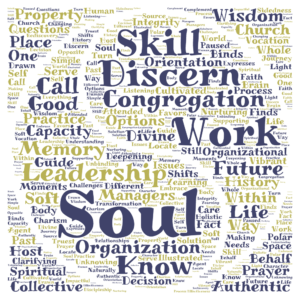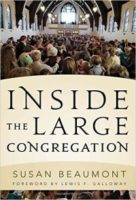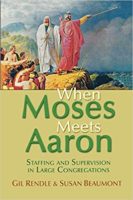The human brain favors binary thinking. We are naturally drawn to the two-sidedness of the world, the fact that everything has an opposite, a polar complement. Light vs. dark, good vs. evil, right vs. wrong, yin-yang.
Leaders of faith-based institutions often embrace binary thinking in organizational leadership. We tend the spiritual needs of our organization with the soft skills of care, prayer and discipleship. Then we turn the soft skills off and guide the organizational side of the church with the hard skills of supervision, governance, facilities and financial management. Two fundamentally different kinds of work. Two very different skill sets. Right?
Wrong! This dualistic way of thinking about leadership is limiting us and the institutions we serve. Holistic leadership recognizes that the institution is host to a soul, a direct agent of the divine spark within. The soul is the authentic and truest self of the institution; the source of its divine calling, and character; the protector of institutional integrity.
Tending institutional soul requires nurturing organizational effectiveness and spiritual wholeness as one.
Soul-Tending Illustrated
West Highland Church is facing life-changing decisions about the future of its building. Membership declined significantly in the last decade. Although the congregation is still vibrant and impactful, it is having difficulty supporting its sizable property and buildings. Several options for the future are on the table. The options range from supporting the operating budget with more funds from the endowment, taking on tenants, or selling the property outright and moving into a smaller space.
Leaders of the congregation began by deepening their knowledge and skill base. They sought out best practices, attended workshops and researched the ins and outs of real estate, finance and property management. Organizational capacity was enhanced by bringing in the wisdom of architects, property managers and investment managers. At the end of this process leaders had a good understanding of the issues and options, but they were stuck in finding a solution that would align the congregation with its history, its mission and the voice of membership.
Finally, leaders paused to consider institutional soul. Through a process of journaling and guided prayer, they emptied themselves of the biases and assumptions that had accumulated during their study. They hosted listening circles to discern the congregation’s orientation to its space. They paused and they prayed. They asked themselves questions about the sacredness of place. They pondered what it meant to befriend the soul of the community through each of the options before them. They reviewed the significance of place in the history of the congregation.
In the midst of this soul-tending work, a way forward began to coalesce. Leaders sold a small parcel of property at the edge of campus and used the proceeds to reduce their mortgage, so that debt became manageable for the present membership base. An exciting and vibrant chapter of church life followed.
This brief illustration highlights four important dimensions of organizational soul-tending work: cultivating collective wisdom, clarifying vocation, unbinding memory, and deepening discernment.
Cultivating Collective Wisdom: Organizations and their leaders know many things, but leading based on what we know does not invite transformation. Today, we face too many challenges whose solutions are beyond simple knowing. Wisdom is a form of knowing marked by our ability to discern the inner qualities and relationships of a situation and to distinguish truth from falsehood.
Nurturing collective wisdom requires shifting our orientation from knowing to unknowing, from advocating to attending, from speculating to presencing, from deciding to discerning. These are countercultural shifts in leadership orientation, rooted in ancient contemplative practice. These are orientations that must be cultivated within our leadership body if we want to do soul-tending work.
Clarifying Vocation: The integrity of vocation is protected by the soul. Who are we? Who do we serve? What is God calling us to do or become next? The soul of the institution knows the answers to these questions. Leaders who discern these questions authentically, on behalf of the soul, have located the charism of the organization. Honoring the charism insures institutional integrity.
Unbinding Memory: John Donohue, poet and theologian, wrote that “soul is the place where memory resides”. The soul of the institution is stable, but not static. It has been on a journey. That journey includes clarifying moments and wounding moments.
Wounding moments in a congregation’s past diminish its future capacity, if left unexplored. One congregation avoids talking about a troubled history, when three successive clergy leaders engaged in inappropriate sexual relationships with members of the congregation. Their failure to meaningfully frame their history contributes to a deep sense of shame about the congregation’s identity. Their shame binds them to past failures and blocks a hope-filled future.
Within the soul of the organization lies a capacity for the rediscovery, reframing and healing memory. There is generative capacity in the rediscovery of foundational memories that have long been forgotten. Through work with lost or damaged institutional memory an organization can rediscover its divine purpose.
Deepening Discernment: Yearning is the language of the soul. The soul of an organization often expresses itself through the collective yearning of its membership body. Soul tending work requires sharpening group discernment skills; it requires deeper listening as collective yearning finds expression.
Discerning on behalf of the whole and with the soul raises some challenging issues. Who is authorized to speak on behalf of the soul of the institution? How does daily decision making relate to discernment? Where do we locate discernment in the life of the institution? Leaders must respond to these questions as part of authentic soul-tending work.
Tending the soul of the institution is more than a simple call to prayer, and it requires more than slapping a scripture verse on top of good business practice. It is more than understanding the culture, strategy and spirituality of a congregation. It requires basic leadership orientations that may seem at odds with traditional practices of leadership. Nurturing the soul-tending capacity of our leaders takes intentionality, time and attention. The payoff is greater authenticity in decision making and the genuine transformation of our congregations.
Susan Beaumont is a coach, educator, and consultant who has worked with hundreds of faith communities across the United States and Canada. Susan is known for working at the intersection of organizational health and spiritual vitality. She specializes in large church dynamics, staff team health, board development, and leadership during seasons of transition.
With both an M.B.A. and an M.Div., Susan blends business acumen with spiritual practice. She moves naturally between decision-making and discernment, connecting the soul of the leader with the soul of the institution. You can read more about her ministry at susanbeaumont.com.




